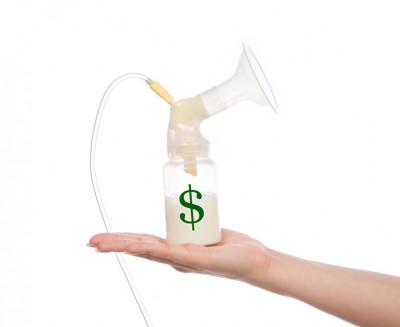I’m a bit late to the party of those writing about the ethics of commercializing breast milk, but I’d like to offer a different view of the issue.
I submit that the commercialization of breast milk is the inevitable result of the natural parenting industry’s relentless commercialization and promotion of products and services that no one needs, primarily to enrich itself. It’s yet another example of how “natural parenting” costs a fortune and the benefits accrue most to the members of the industry.
The philosophy that sails under the flag of “natural parenting” ought to be free, right? It was certainly free in nature. But instead it is remarkably expensive and, therefore, an indubitable sign of middle and upper class privilege.
Consider:
If childbirth is natural, why do you need to hire an army of consultants from childbirth educator, to midwife, to doula? In nature, women were assisted by friends and companions for free.
If childbirth is natural, why do you need to buy an array of herbs and supplements? Animals don’t use them; they don’t work, and they cost money.
If childbirth is natural, why do you need any books, relaxation tapes, birth pools or birthing balls? None of those exist in nature and all cost money.
If breastfeeding is natural, why do we need lactation consultants? In nature, women were assisted by friends and family members for free. Prior to the 1980’s any woman could be assisted in breastfeeding by La Leche League, a volunteer organization. But then La Leche League realized the money to be made by professionalizing breastfeeding advice, and created the lactation consultant credential. It started an organization to administer (and charge for) the credential and women suddenly had to pay for assistance they previously got for free.
If breastfeeding is natural, why do we need breast pumps and supplements to stimulate milk production?
If attachment parenting is natural, why do women have to buy slings to hold their babies? Animal mothers don’t use slings.
I could go on, but I think you get the idea. You don’t need any of these things in order to give birth, nourish and raise a baby, but the natural parenting industry insists that you do because that’s how they make their money.
It was only a matter of time before a black market in breast milk arose, so that women who couldn’t make breastfeeding work by buying the services of lactation consultants could fork over a fortune buying the breast milk itself. The black market in breast milk is unregulated; there is no screening; there is no pasteurization and it is nearly impossible to know if you are getting the substance you paid for.
The problems with a black market in breast milk are legion. Studies have show that the milk is often contaminated. Microbial Contamination of Human Milk Purchased Via the Internet, was published in Pediatrics in 2013. The authors found:
Most (74%) Internet milk samples were colonized with Gram-negative bacteria or had >104 colony-forming units/mL total aerobic count. They exhibited higher mean total aerobic, total Gram-negative, coliform, and Staphylococcus sp counts than milk bank samples. Growth of most species was positively associated with days in transit, and negatively associated with number of months since the milk was expressed, per simple linear regression. No samples were HIV type 1 RNA-positive; 21% of Internet samples were cytomegalovirus DNA-positive.
CONCLUSIONS: Human milk purchased via the Internet exhibited high overall bacterial growth and frequent contamination with pathogenic bacteria, reflecting poor collection, storage, or shipping practices…
Just this week Pediatrics published a new study shows that commercialized breast milk is often adulterated with formula or cows milk in order to increase profit margins. According to Cow’s Milk Contamination of Human Milk Purchased via the Internet:
Ten Internet samples [10%] had bovine DNA concentrations high enough to rule out minor contamination, suggesting a cow’s milk product was added. Cow’s milk can be problematic for infants with allergy or intolerance. Because buyers cannot verify the composition of milk they purchase, all should be aware that it might be adulterated with cow’s milk. Pediatricians should be aware of the online market for human milk and the potential risks.
Why on earth would a mother feed her baby someone else’s breast milk that might be filled with bacteria or corrupted with cow’s milk, the very substance that these mothers were specifically trying to avoid?
Why? Because they’ve been indoctrinated to believe that breast milk (even someone else’s breast milk) is “liquid gold” when it is nothing of the kind. To my knowledge, there has not been even a single study showing that there is any benefit to feeding someone else’ breast milk to a baby.
But that doesn’t matter because parents have also been indoctrinated to believe that raising a superior child “naturally” is a project to be managed with lots of money. The commercialization of breast milk is merely the latest form of conspicuous consumption, easily available to the privileged and utterly out of reach of those lower on the economic scale.
In fact the only thing surprising about black market breast milk is that it took so long for the natural parenting conspicuous consumption brigade to think of it.


